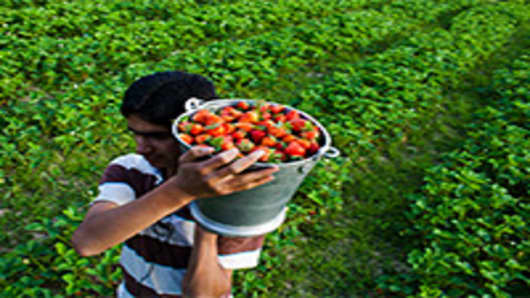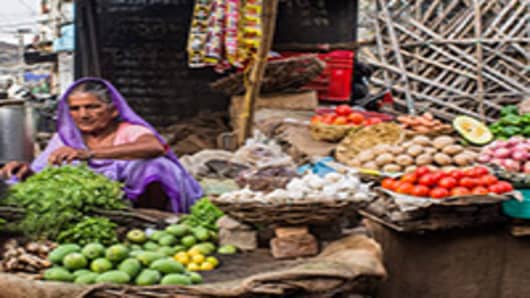Second in the world only to China in farm output, India is the largest global producer of lemons, limes, milk, sunflower seeds, chick peas, okra, tropical and fresh fruit like bananas and mangoes, major spices like ginger and anise and staples like millet and castor oil seed.
With that kind of gluttonous production, you would think India's agriculture industry would be a prime target of foreign investment. Yet it hasn't.
But with an eye toward a slowing economy, devastating droughts, as well as a distribution problem that's left millions of its own citizens starving, the government in New Delhi is slowly trying to open up its food industry to outside forces.
"There hasn't been much investment overall in India's agricultural industry, but there's reason for some hope going forward," said Abdur Chowdhury, a macroeconomist and professor of economics at Marquette University.
What India has done to create that hope is to allow foreign investors in the retail sector for the first time. (More:Investing in India? Here's How)
"That means a Wal-Mart can open in India and create more and bigger outlets for food to be sold," Chowdhury said. "That will allow foreign investors to know there is a way to see their food products sell and should create more investment opportunities in Indian agriculture."
Agriculture and its related sectors account for more than 16 percent of India's gross domestic product and employs nearly two-thirds of the country's workforce, according tothe Food and Agriculture Organization.
However, four droughts in 12 years have devastated some crops — and even though India still produces mass amounts of food, some 225 million Indians are under-fed and under-nourished, according to the Global Food Security Index.
The country's internal problems keep it from producing more while feeding its people, according to George Haley, professor of marketing and international business at the University of New Haven.
"Right now, rice can only be kept in a government facility. What would be good is if the government would more or less step out of where it's inefficient in the marketplace."
"They have tremendous spoilage problems with food. There's no capacity for freezing foods, for example, and the transportation system is bad. Food rots before it gets delivered, and there's a lot of corruption as well," Haley said. "They have a bad irrigation problem, and they also need bigger farms." (More:India Declares, 'We're Back in Business')
The issue of bigger farms has many of India's small farmers and retailers worried. Opposition parties to the Indian government said the decision to allow foreign investors in retail will hurt millions of small store owners who will not be able to compete against multinational retailers. Small farmers would be gobbled up by foreign conglomerates and leave them without work.
However, Haley said, until the size of the farms change, foreign investment will be slow to find India's crops. "It's hard for these small farmers. They certainly don't want to be out of work. But the bigger farms, the better for investment," he said.
For those eager to get in on India's agricultural industry, there is the Multi Commodity Exchange, which has taken the fifth spot among the global commodity bourses in terms of the number of futures contracts traded — and opened up to foreign investors just this year.
And there are international firms on the ground in India. Pepsico , the American-based maker of snacks and beverages like Frito Lay, Gatorade and Pepsi, has been in India since 1989 and says it is working with 24,000 local farmers to produce food. "More than 45 percent of these are small and marginal farmers with a land holding of one acre or less,"according to its website.
Also in India is American farm machinery maker John Deere . Its factory, located near the city of Pune, manufactures agricultural tractors.
But these are more exceptions than the rule, said Mark Milstein, a professor at Cornell University's graduate school of management.
"Private investment in India's agriculture has actually fallen off from the previous decades. It's a highly politicized sector of the economy, so it's hard to make changes," Milstein said. Changes are needed for even how crops are stored, he added. (More:10 Hot Indian Startups)
"Right now, rice can only be kept in a government facility. What would be good is if the government would more or less step out of where it's inefficient in the marketplace," Milstein said.
Despite all the problems of corruption, poor distribution and government regulation, experts say India's agriculture sector does provide opportunities.
"It's not easy, but there is great potential for investors in areas like tea and sugar cane," Chowdhury said. "The size of the market alone is worth it."



